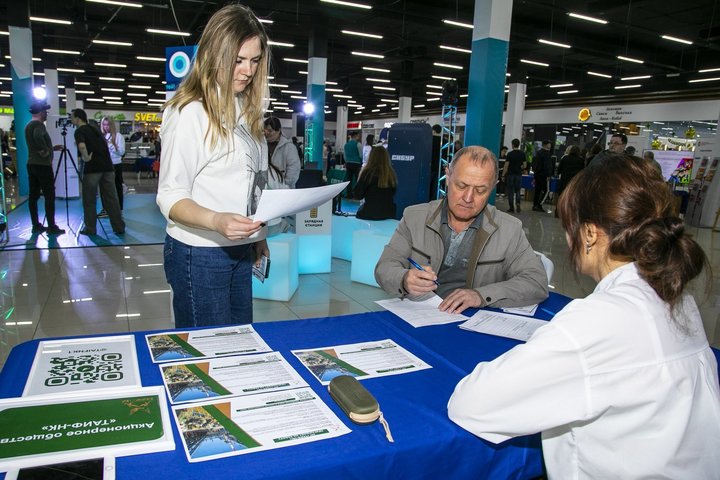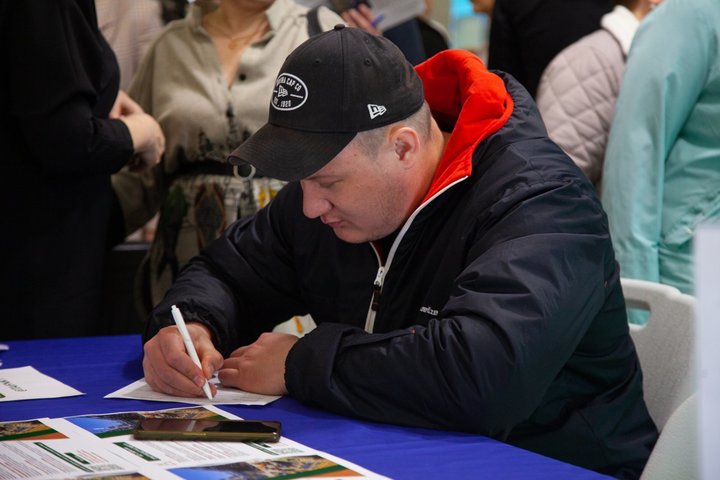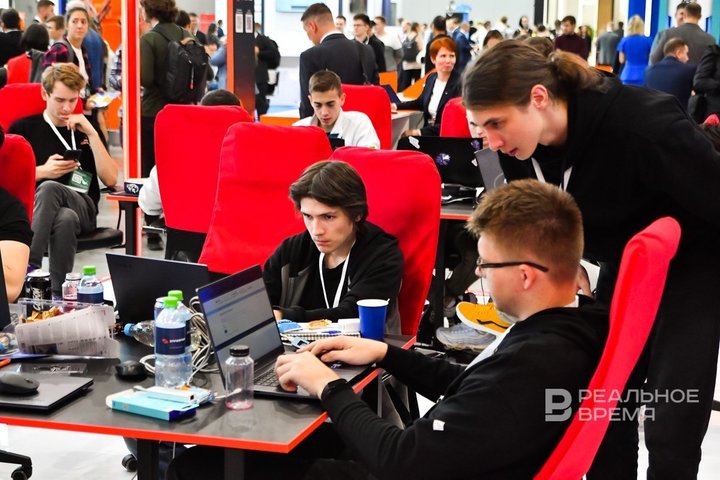Labour market 2025: hybrid employment, trend of micro-quits, and search for meaning in life

Compared to 2024, the first half of this year has been less tense on the Russian labour market — the pronounced wage race is no longer present, but targeted competition for strong specialists remains. Employer activity continues to decline, with a focus shifting towards employee retention and increasing engagement. Which industries in Tatarstan are still facing an acute staff shortage, and what job seekers expect from work — in the report by the analytical service of Realnoe Vremya.
In Tatarstan, 6.1 CVs per vacancy
The labour market situation in Tatarstan is becoming less acute — the level of competition for vacancies is rising, according to open statistics from hh.ru. Since March 2025, the hh-index — which reflects the ratio of active CVs to active vacancies — has increased in the region from 5.1 to 6.1. For comparison, in May 2024 it stood at 3.1, and in December 2024 — at 4.7.
As of early June, moderate competition persists in Tatarstan’s labour market. There are 6.1 CVs per vacancy in the republic, the same as a month earlier, which is 0.5 points above the national average. A figure below 4.0 indicates a pronounced staff shortage.

The most acute staff shortages in Tatarstan are observed in retail (hh-index — 1.6), healthcare and pharmaceuticals (2.9), and sales (4.0). The tourism industry, hotels and restaurants (4.3), as well as the automotive sector (5.4), are also facing staffing challenges.
There is an oversupply of candidates in strategy, investment and consulting (hh-index — 29.7), arts, entertainment and mass media (28.4), top and middle management (23.8), marketing, advertising and PR (17.1), and procurement (14.4).
Labour market under the influence of macroeconomics and geopolitics
Employer activity in the labour market continues to decline. In May, they posted over 30,300 vacancies — 30% fewer than a year earlier. At the same time, job seeker activity keeps growing: in May, they created or updated 185,000 CVs, which is 36% more than in 2024.

The median offered salary in Tatarstan at the end of May was 70,000 rubles, while job seekers’ expectations were exactly 10,000 higher — at 80,000 rubles. Across Russia as a whole, the offered salary averaged 75,000 rubles.

“There are many possible scenarios for how the situation might develop: we may see varying levels of volatility, a deeper downturn in certain sectors of the economy, and, for example, a slight rise in unemployment," she believes. “Although historically, unemployment in our country has not risen sharply during times of crisis.”
Despite signs of a cooling labour market, unemployment remains at a record low in 2025 — 2.3%. It has stayed below the 4% mark since 2023. According to the Ministry of Economic Development’s baseline scenario, the situation is not expected to change dramatically over the next three years: the unemployment rate will remain around 2.5%.
Staff shortages have not disappeared
At present, we are observing a 10% decrease in the number of vacancies and a 14% increase in the number of CVs compared to 2024, SuperJob reports. Last year, vacancy growth was off the charts, while fluctuations in the number of CVs were minimal. “At first glance, it may seem that the problem of staff shortages has been solved, but that is not the case. The talent gap has not gone anywhere: compared to last year, demand for personnel has stabilised, yet the situation remains acute. Relative to 2023, there are more vacancies, while the increase in the number of CVs is modest and does not keep up with demand — especially considering that most job seekers today are not unemployed but employed individuals looking for better conditions, primarily in terms of salary," the service's press office notes.
According to SuperJob’s forecast, high demand will persist over the coming year for frontline staff in retail and HoReCa, skilled workers in construction and manufacturing, truck drivers, and warehouse personnel. The demographic situation remains unfavourable. The job seeker base is ageing. Salary offers will continue to rise, with companies indexing wages to account for inflation. Employee retention will become even more important. The Russian labour market has historically demonstrated strong resilience to economic challenges. Experience in overcoming global and local crises has strengthened its adaptability.
IT, Technical Disciplines, and Medicine — the top 3 fields chosen by school graduates in 2025. Career guidance experts at SuperJob advise applicants to choose their field of study based on their interests and aspirations. Success and professionalism can be achieved in any sphere. However, when it comes to choosing an educational institution, it’s important to be strategic: taking into account one’s exam scores (OGE/Unified State Exam), one should prioritise universities with strong teaching staff, internship opportunities, and a solid academic foundation.
“No pronounced wage race anymore”
Galina Akhmerova, founder of the Darwin Foundation for the Development of Accessible Modern Education and creator of the Round platform, also notes that overall labour market tension is easing, particularly in major cities and mass-market professions.
However, some categories remain in short supply — for example, IT, retail, healthcare, and the industrial sector, where there is strong demand for qualified personnel and middle management.

According to the interviewee, several factors have influenced the labour market situation: the optimisation of business processes and automation; a decline in employer activity in a number of sectors (such as hiring office staff); and a growing trend towards internal talent development — companies are focusing on retention and internal growth rather than large-scale external recruitment.

Companies have stopped competing solely on salary — those who win are the ones offering: development (clear career paths, mentoring, training), flexibility (remote work, flexible hours, results-oriented approach), engagement (recognition, internal culture, gamification), and a meaningful mission.”
“On the Round platform, we observe that motivation is shifting towards non-material factors — recognition, growth opportunities, a sense of belonging, and internal team support,” Akhmerova notes as an example.
Among the stable trends currently shaping the Russian labour market, the interviewee highlights the focus on retention: companies are hiring less externally and investing more in internal development. This has led to growing interest in corporate development platforms.
The HR function is shifting from recruitment to managing engagement and culture — those who succeed are the ones able to create a sense of ‘attraction’ within the company.
Today, according to the expert, there is a strong demand for meaningful work — especially among young people: “People want to understand the purpose behind what they do. This affects both loyalty and productivity.”
In addition, the perception of a career has changed — trends such as micro-retirement (a conscious break from work), gig formats (from the English ‘gig’ — temporary work), and hybrid employment have become part of the new reality. People no longer want to simply “work” — they want to live, and work should fit into their lifestyle, the speaker concludes.

In her view, the wage race has not ended entirely, but has entered a different phase. Salaries in a number of professions in Tatarstan continue to grow, but no longer in the format of a “race” — rather, in a logic of justified increases, where every ruble must be backed by performance.
The average salary in Tatarstan in 2025 stands at approximately 71,600 rubles — an 11% increase year-on-year. In several industries, this growth is particularly pronounced: in manufacturing, salaries have risen by 23% (reaching 94,500 rubles); in transport and logistics — up to 200,000 rubles for driver positions; and in blue-collar professions (such as electrical fitters and turners), the increase ranges from 25% to 37%.
“This is targeted salary competition, not a widespread race. And increasingly, companies are offering not just a high salary, but a full package of values: social benefits, training, career growth, flexibility, a strong team, and a sense of purpose,” she notes.
The main trends across the country and the region include a shortage of skilled labour, a shift from talent ‘hunting’ to talent development, automation of HR processes, growing employer focus on soft skills, and the rise of regional potential. “Kazan is increasingly becoming a hub for the localisation of functions from Moscow — particularly in IT, marketing, customer support, and HR management. This creates steady demand for specialists with knowledge of local specifics and basic digital literacy,” the interviewee says.
“Today’s labour market demands flexibility, technological awareness, and a systematic approach. The staff shortage is not a temporary phenomenon, but a new reality. As employers, we must learn not just to hire, but to retain and develop talent — especially in the regions. This requires a rethinking of the HR role and greater attention to internal corporate culture and employer branding,” Yakusheva emphasises.
Tatarstan
